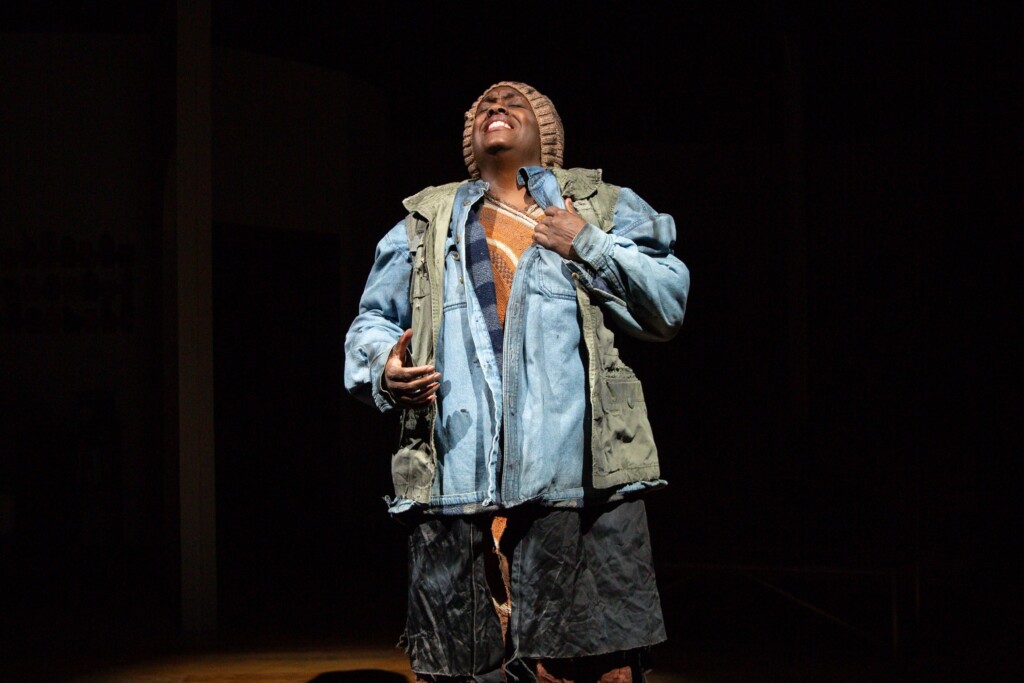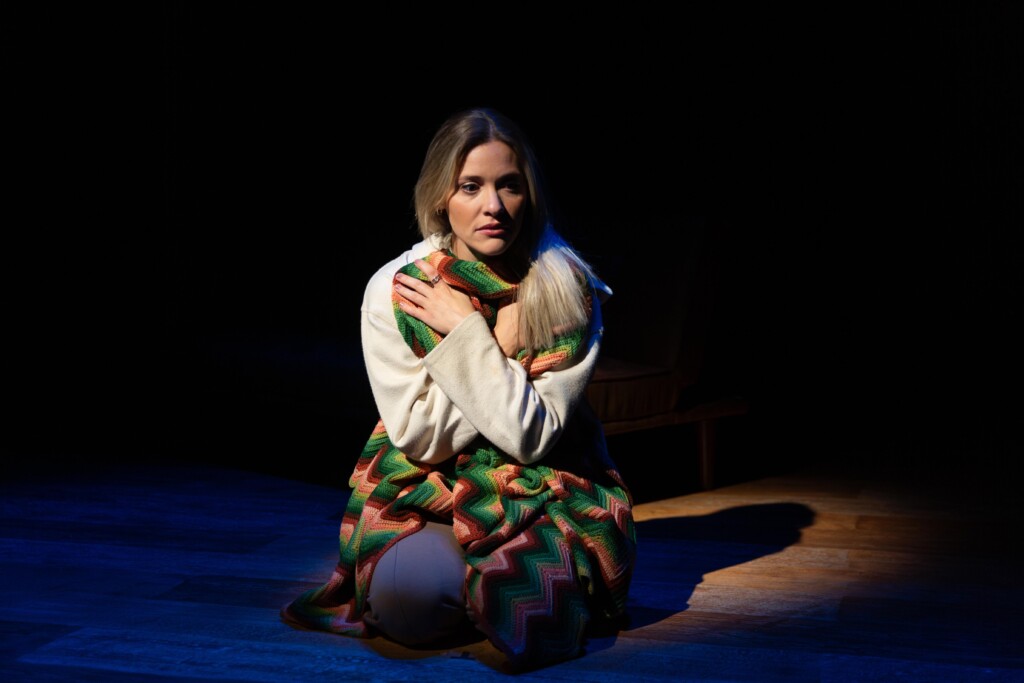Chisa Hutchinson’s Whitelisted opens not on stage, but in the theater, as Yvette (splendidly played by Dee-Dee Darby-Duffin) rises from a seat and is asking for donations from audience members. Her sincerity is striking. Yvette is mourning the untimely death of her daughter, and is asking for assistance to help with the costs of burying her beloved one. On opening night, I heard a woman sitting in the row ahead of me, whispering to her seatmate, “Is this part of the play?” In fact, a few seem stunned, wondering about the possibility that someone might have come to the theater especially for that purpose. Several theater patrons willingly offered donations.
An unconventional prologue, it also is the sort of opening sequence one might see in a horror film, to pitch the stakes for what it is about to unfold. In the theatrical space, it ingeniously primes the setting for Whitelisted, a finely executed case of transporting the fascination with cinematic horror narratives to the stage and achieving convincingly many of the same spontaneous audience reactions one might hear in a movie theater.

Salt Lake Acting Company’s (SLAC) regional premiere of Hutchinson’s Whitelisted is a bristling ride that also becomes an informal experiment of the connections between enjoying a good horror story and finding an empathetic resonance with the characters. Most notably, it is Yvette who seeks a modicum of cosmic justice from a system that failed her and cost the life of her daughter.
Directed with deft hands by Latoya Cameron and Tito Livas, the SLAC production snaps with excellent acting and impressive use of lighting and shadows, along with boffo set designs that emulate credible 3-D effects which typically thrill horror film lovers. The production continues through Oct. 27.
In an interview published elsewhere, Hutchinson said that she was, in part, motivated by the impact of Jordan Peele’s Get Out, a low-budget psychological horror film that premiered at Sundance in 2017 and went on to become a major box office smash hit. Thinking about how the experiences of Black Americans “just lends itself to the horror genre,” Hutchinson recalled a New York City incident in 2020 involving Amy Cooper, who became known as the “Central Park Karen.” She called the police, which was captured on video that went viral, to lodge a complaint against Christian Cooper, who is Black and was birdwatching, and had asked her to leash her dog while in the park.

Photo Credit: Todd Collins.
Hutchinson said something similar occurred to her and husband, in connection with a next door neighbor whom she described in that aforementioned interview, as “quite antagonistic,” and had regularly shouted racial epithets to them from her open windows. After another neighbor called the police, the woman in question mistakenly assumed that Hutchinson and her husband had called the police on her, and, in return, the enraged woman, whom Hutchinson said was “crazy and racist,” called the authorities on them, claiming they were harassing her.
In Whitelisted, the narrative outline takes on some of these contours. Rebecca is a well-to-do craftsmaker who specializes in making furniture and decorations for miniature dollhouses. Her character reminds us in part of the real-life neighbor Hutchinson and her husband had to endure. Rebecca epitomizes the individual at the heart of the debate about gentrification. She adamantly refuses to engage with or fit in with her neighbors in the other brownstone buildings. She envisions herself as socially enlightened, reminding everyone that she voted for Obama in both of his presidential elections. But, her racist expressions, which at first seem like the garden variety of accidental racism, quickly become unhinged, strident and vicious, as the narrative proceeds.

Photo Credit: Todd Collins.
Mindful of not spoiling the heart of the horror pillars anchoring the relevant intersectional themes Huntington has marked out, one can say that all sorts of “weird supernatural shit” starts to happen. The first instance occurs after Rebecca brings home a date (Ryan, played by Eliyah Ghaeini) and the strange happenings pick up speed when Diego (played by Jacob Barnes), a security consultant, spends time in her home to assess the situation and turn her home into a fortress with cameras at every possible angle in hopes of capturing the supernatural events.
The horror effects are good, as evidenced by the gasps and startled reactions from some audience members. But, the most vocal reactions from audience members are courtesy of Hutchinson’s pull-all-the-stops approach in the dialogue she has scripted and the outstanding actors who extract the dramatic punch along with timing their delivery of some juicy bits of dark comedy.
Rebecca’s increasingly unhinged racist tirades elicited loud responses in the theater, such as “oh my God, I can’t believe she said that.” Diego was a paragon of patience, which also ratcheted up the tension until he finally had enough of her antagonistic barrage. Likewise, Rebecca’s insufferable sense of entitlement brought reflex responses, such as when Officers Black and White visited her home (great counterpoint performances by Darby-Duffin and Gaheini, respectively. The officers suggest that Rebecca might be the target of some clever pranks. At times, the feeling of Schadenfreude is palpable, with many of us wondering when Rebecca will finally be held accountable for her utter obliviousness about why these strange things were happening and whether or not she might for even a moment rethink her behavior. Easing the tension for a few tender moments in the play was the brief appearance of Yvette’s daughter, Maya (played by Betty Kalunga).

Hutchinson’s layers in Whitelisted are well crafted. It is not just propelled by racism but also a contemplation of the complexities of gentrification and the reasons why it can become inhospitable and problematic if not handled sensitively and respectfully. It also is an example of a systemic problem in health care about significant racial disparities in doctor-patient communications, a critical issue that has been documented by extensive empirical research. It also is a moment for us to recognize how unconscious or implicit biases might play in our own tendencies to judge or decide what to do or how to behave in critical situations and communicate more sensitively in general.
SLAC audiences are known to be, in general, proud of being progressive and enlightened in social and political arenas. Many probably would swear that no way could they ever imagine behaving like Rebecca, even if to a far lesser degree. But, Whitelisted also is a play that should make audiences feel at least a bit uncomfortable and open to assess their own behaviors. As Hutchinson said in the earlier cited interview, “I’m not pointing my finger or shaking my fist at anyone in particular,” she explained. “It’s just, ‘Here is a character I’ve observed out in the world and if you happen to share any of those characteristics, maybe think about that quietly on the way home.’ I like to think I create a private space for an audience member to think about where they fall on the spectrum. And if they’re not liking that feeling of ‘I think I am kind of guilty of that and I didn’t realize the implications of that until now,’ then sort of think about modifying that behavior.”
This is why Whitelisted works well as a horror story on stage and the SLAC production skillfully positions this creative objective with gratifying and illuminating results. For tickets and more information, see the SLAC website.

